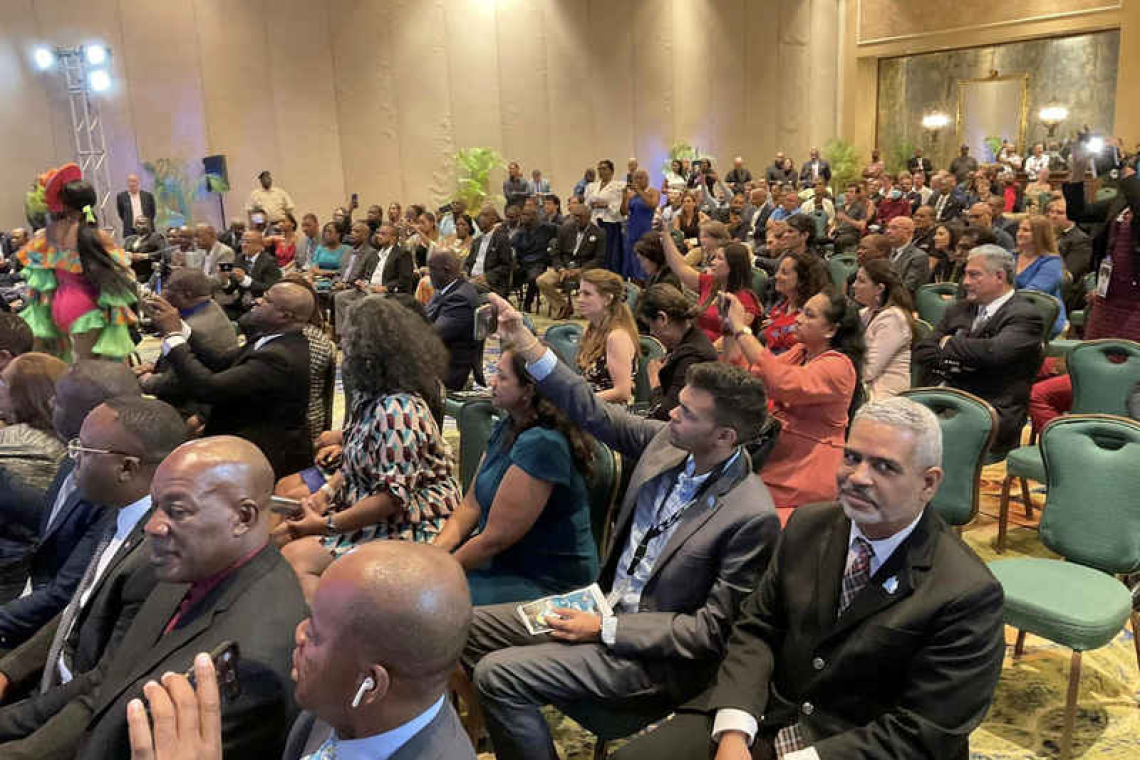A scene during CWWA’s opening. (Photo from CWWA’s Facebook page)
PHILIPSBURG--Non-revenue water loss in St. Maarten is down from 39% to about 22%, which is lower than the Caribbean average of 45%.
Minister of Public Housing, Spatial Planning, Environment and Infrastructure VROMI Egbert Doran provided the information during the live Council of Ministers press briefing on Wednesday, while reporting on his attendance at a high-level forum in The Bahamas, of Caribbean ministers responsible for water, wastewater and waste, hosted by the Caribbean Water and Wastewater Association (CWWA).

CWWA’s opening ceremony. (Photo from CWWA’s Facebook page)
The event was themed “Global resolution to regional solutions – let’s end plastic pollution”. CWWA’s 31st Annual Conference and Exhibition was held in The Bahamas October 17-21.
“We have been making great progress as an island in our water infrastructure and water supply,” Doran said. “The average non-revenue water [loss – Ed.] is about 45% throughout the Caribbean and St. Maarten has reduced our water loss from 39% to approximately 22% over the last several years. We also have 24/7 water supply, which is a good thing comparing to other Caribbean countries, which also formed part of the discussion.”
He said there is great interest by financiers to aid many of the islands in the region in addressing the non-revenue water loss.
“Addressing the non-revenue water loss directly correlates with our carbon footprint, as well as fossil fuels that are used to produce water. We will continue to strive as we build on this progress to make a better future for our children and also the generation to come after. One of the main challenges we face on the island, which is shared within several other Caribbean nations, is proper waste disposal,” said Doran.
Former GEBE Interim Manager Mauricio Dembrook had told Parliament in June last year that net water losses at GEBE had gone down to 24.4% as of March 2021 compared to 37.9% in November 2020. Dembrook had said at the time that consumers pay only for the water they consume. No surcharge for water losses is applied to consumers.
He had also explained that with an average daily water distribution around 16,400 cubic metres (m3) per day, the operational water storage capacity of GEBE has to be around 49,000m3 for three days’ storage, or around 33,000m3 for a two-day storage.
Doran told reporters on Wednesday that he was honoured to participate in the high-level forum. He said regional water and wastewater strategies had been shared and participants had received insight into new technologies and innovation.
“Being able to participate in this discussion opened the doors for effective collaboration within the Caribbean region to solve our common challenges. Over the conference a constant phrase was used, which was ‘purpose driven’, and I believe now is the time for all of us to put our words into action, as I mentioned there during their press conference,” said Doran.
“As we transition into the integrated solid waste management system in St. Maarten, it was a great experience to learn from our other islands within the region and their best practices and also their pitfalls. As the government, we do not need to reinvent the wheel, as I mentioned time and time again. Where things are possible, we have been allowed to move forward and this can also be done.
“As part of the regional cooperation we signed a statement of acknowledgement to further strengthen our regional collaboration and approach in addressing our shared challenges. It’s always an honour to represent St. Maarten and this conference was no exception.”
Doran said he had been able to forge relationships with the ministers of St. Kitts, Trinidad and Tobago, Guyana, host country The Bahamas and the commissioner from neighbouring St. Eustatius.
“As government and as the Minister of VROMI I am deeply committed to seeing our beautiful St. Maarten being a clean island. This can only be achieved if we all put our heads together and are determined to be the change that we want to see on our island.
“We do not have to wait for regulations to force us to do what is best for ourselves, for our children and for our environment. Let us reduce, reuse and recycle, and stop littering and properly dispose of our waste. Teach our children to do the same. The change begins with me. The change begins with you. The change begins with all of us,” said Doran.







